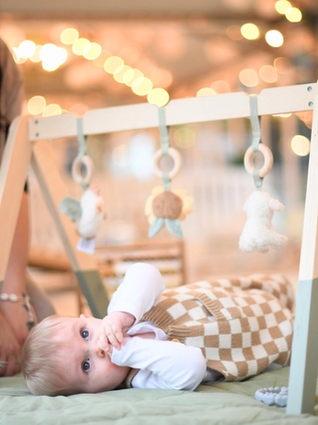
- Home
- Tools And Resources
- Baby Development Calendar
- 15–16 Weeks Old Baby | Development
15-16-weeks-old baby
2 min
Babies at this age…
- Will gurgle happily and squeal with delight
- Are endlessly amused by their hands and feet
- Will start to put everything in their mouth (and we do mean everything!)
- Are getting better at watching moving things and spotting very small objects
- Can usually realise where sounds come from and will turn to look for them
Your baby
- Repeating the same little games and songs might seem boring to an adult, but it helps babies learn... so how about another round of “Incy wincy spider”?
- Putting a mirror where your baby can see his or her reflection can lead to some wonderfully confused faces!
- It’s good for babies’ neck muscles to be put down on their tummies to play - a soft play mat with interesting colours and textures is useful here.
- A bouncing cradle will let your baby see more - and it also bounces when baby kicks
Vaccination time again
A few more jabs are in store for your little one at around 4 months old, but it's all for a very good cause, and there'll be no more until around 12 months. (Whew!) For more information, check the NHS vaccination planner.
Getting ready for weaning
It won’t be long before you’re thinking about offering your baby that exciting first taste of solid food – another big milestone! Most health professionals recommend starting weaning at around 6 months, but some babies may be ready a little earlier.
That said, it’s important not to start too soon. Babies’ digestive systems aren’t mature enough to handle solids before 17 weeks, so if you think your baby might be ready before 6 months, it’s best to speak to your GP or health visitor for guidance.
Want to know what to look out for and how to prepare? Visit our weaning section for signs of readiness, tips on getting started, and what you might want to have on hand for the big day.
Thinking about going organic?
As your baby gets closer to starting solids, you might be considering organic foods – and with good reason. Babies’ systems are still developing, so many parents feel reassured choosing foods made without chemically synthesised pesticides or additives. Organic fruit and vegetables can be a great way to offer your baby simple, nutritious first tastes.
If you like to plan, now’s a great time to stock up on organic carrots, sweet potatoes, apples, pears and other gentle ingredients – perfect for puréeing when the time comes.
HiPP – organic pioneers
Here at HiPP, we have over 60 years of experience in bringing you a delicious range of organic, ready-to-eat weaning foods. HiPP Organic Baby Rice, for example, is a gentle first food because it is very pure, simple and mild. Mix it with the baby’s usual milk or use it as a base for fruit or vegetable purées.
